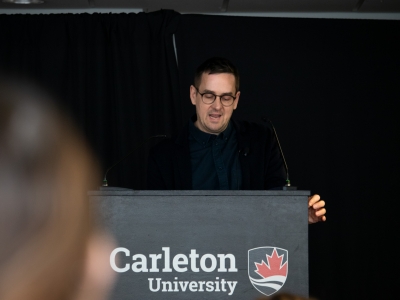Alex Wilner is a recipient of the 2021 Early Researcher Award.
By Joseph Mathieu
Deterrence theory is technically very simple: a defender needs to convince an aggressor that either the costs of engagement are too high, or its benefits are too low. When it comes to deterring cyberattacks and hackers, however, the issue becomes more complicated.
“It isn’t easy given the scope of cyberspace, the number of different actors engaged within it and the range of targets available to malicious actors,” says Carleton international affairs Prof. Alex Wilner. “But it is doable and worth expanding upon.”

Cyber deterrence can entail threatening to punish aggressors in both cyber and physical space with retaliation (a process called deterrence by punishment), denying aggressors easy access to digital networks and defending against intrusions (deterrence by denial) and, possibly, expanding the norms of cyber engagement to make certain cyberattacks less inviting (deterrence by delegitimization).
These forms of deterrence are at the forefront of Wilner’s research, which has effectively shaped the international discipline in the 21st century. Cyber deterrence has been studied in earnest for a decade, although some scholars were exploring the subject as early as the 1990s. The exponential expansion of the Internet and of online discourse in everyday life has assured an increase in cyber deterrence research.
Read full story in Research News…
Wednesday, August 11, 2021 in News, Norman Paterson School of International Affairs, Research
Share: Twitter, Facebook



